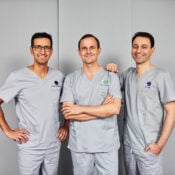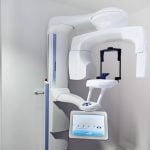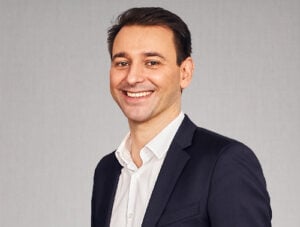Head & Neck Tumors
HEAD & NECK TUMORS
PREVENTION & EARLY DETECTION
RISK FACTORS
In recent years, the risk of developing a head and neck tumor has increased – and although the disease mainly affects men, the number of cases has grown considerably, especially among women. Therefore, you should pay attention to the following risk factors that can promote the development of head and neck tumors:
- Smoking
- Alcohol
- Human papilloma viruses (HPV)
SYMPTOMS
The symptoms of a head and neck tumor can seem quite harmless on their own. Therefore, it is important to follow the so-called “1-for-3 rule” to enable the earliest possible detection of the tumor. According to the “1-for-3 rule”, you should definitely consult an ENT or Oral and maxillofacial specialist if any of the following symptoms persist in you for a period of more than three weeks:
- Non-healing sores in the mouth or on the tongue
- Red or white spots in the mouth
- Sore throat
- Persistent hoarseness
- Painful and/or difficult swallowing
- Swelling of the throat
- Blocked nose on one side and/or nosebleeds
DIAGNOSTICS
In order to provide the best individual treatment for you, we will carry out a detailed and complete diagnosis on you, on the basis of which your attending physician will derive the further treatment steps. Various factors are decisive here, such as the size and exact location of the tumor, the involvement of local lymph nodes in the neck area, or whether distant metastases are already present. All modern methods are used for diagnosis:
- Sonography (ultrasound)
- Computer tomography (CT)
- Magnetic resonance imaging (MRI)
- Scintigraphy
- Positron emission tomography (PET)
TREATMENT
Depending on the diagnostic result, your attending physician will determine your very individual treatment plan after presenting your case in the interdisciplinary tumor conference. As a rule, this is a surgical procedure, the goal of which is to completely remove the entire tumor, if possible, as well as any affected lymph nodes. We cover the entire spectrum of surgical tumor therapy in the head and neck region, from minimally invasive procedures and laser surgery to extensive tumor resections with plastic defect reconstruction using microvascular anastomosed autologous transplants.
Depending on the location and stage of progression of the tumor, radiotherapy and/or chemotherapy may also be considered.
AFTER TREATMENT
TREATMENT OVERVIEW
Before surgery:
- Detailed consultation
- CT or MRI imaging
Procedure:
Anesthesia:
Aftercare:
- Inpatient stay between 3 - 14 days depending on extension
- Outpatient follow-up within the regular tumor follow-up in the following years
To note:
We are
here for you
MAKE AN APPOINTMENT ONLINE
Just a few clicks to your individual desired appointment. Simply enter your type of insurance, your reason for treatment and your preferred appointment time.
OPENING HOURS
Our opening hours are Monday to Thursday from 8:00 AM – 5:00 PM, and on Fridays from 8:00 AM – 2:00 PM, as well as by appointment.
CONTACT
You can reach us by phone from Monday to Thursday from 10:00 AM – 12:00 PM and 2:00 PM – 4:00 PM, as well as on Fridays from 10:00 AM – 12:00 PM at +49 (0)89 8292 4444 or at any time by e-mail.
HOW TO FIND US
You can reach us by car and by local and long-distance public transport. Our premises are conveniently located near the Munich-Pasing train station.












